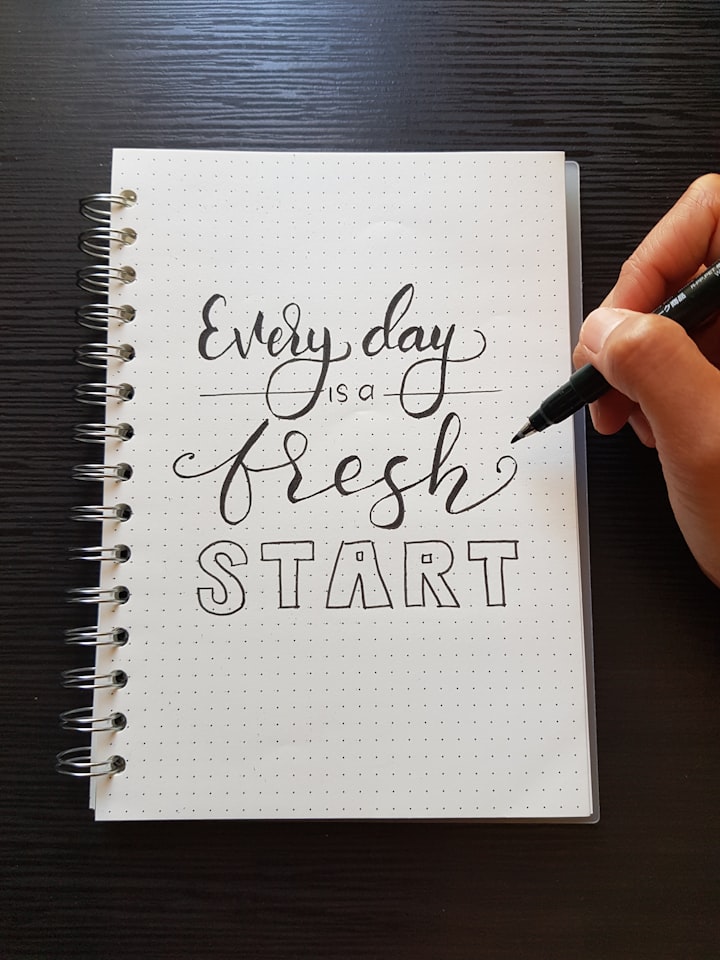Writing and Mental Health
The Many Benefits of Writing And Mental Health

Many long years ago when my mental health took a massive turn for the worst I would be saying to myself
"I can't write anymore!"
I gave up on writing during that time, even though I loved doing it. I lost my confidence, self-esteem, and just trying to get up in the mornings became too much.
I spent a lot of my life in and out of the hospital due to trauma, and that went on for almost ten years.
I shut every feeling inside me and locked what I called
'the trapdoor'
That was a term for the box inside my brain where I locked everything inside, and refused to talk to anyone for fear of being judged.
Nobody should ever have to feel judged for having mental health problems. However, there is still a lot of stigma around people who talk about mental health. That stigma led to shame, which stopped me from talking for a long time. If you are dealing with mental health, remember it's okay to talk and nobody has the right to make you feel ashamed of that.
After many long years of struggling to accept my problems, I finally accepted help. I did Dialectal Behavioural Therapy
I was afraid to talk initially. I had tried talking about domestic violence, sexual abuse, being bullied, and sexuality in the past, only to find myself revictimized and I became the target of abuse again.
My therapy went on for six weeks, and we did some group therapy. I attended every session but one, and that was because I was very physically unwell.
After about three weeks, I started opening up and talking with the group and my therapist. I came to realize that this was a safe environment where people would listen to me without judging me, and I found people who I could relate to.
- During the therapy sessions, we did some writing. I will list what I found useful below:
- The postbox method: Writing one or two feelings on a small note then posting them in a postbox.
- Poetry: Expressing emotions using imagery in a poem to help uncover deep-rooted feelings.
- Letters to my abusers: We didn't send these. However, the simple act of writing all my angry feelings in a letter to my abuser enabled me to deal with the guilt and shame that I had hidden for so long.
- Fiction: Writing fiction brought back memories from school, and it helped me to remember the one thing that I enjoyed before the trauma. It provided a lot of relief, by allowing me to be creative and jump into another world where I felt safe.
- Journaling: I still go back to this. I pick an emotion for the day, and I add a picture to go with it, then, I write about why I feel that way. I use poetry too, because that helps me to uncover hidden emotions.
- I found there were a lot of mental health benefits from this, such as:
- Allowing myself the freedom to express my anger in a safe way.
- Recognize the abuse was not my fault.
- Relieving the sadness, guilt, and shame through the use of words.
- Creating a happy space where I could free my mind, and be creative with stories
- Find a new perspective on my feelings
- Decide where I really wanted to be after recovery.
I still use writing as a tool to heal my mental health. I've created many fiction stories and poems based on my feelings, and the things that seem real inside my head.
Some of my horror fiction is based on some of the nightmares that I still deal with on a regular basis. Writing horror helps my brain to understand that this nightmare is not happening in real life, and it helps me to create an adventure from them which I find freeing.
This is one of them which developed as a result of a nightmare that I had.
When I have a nightmare, I turn it into horror fiction because that helps me to make sense of it, and I always feel better once I've written about it.
Writing is a great tool for mental health. It allows you to explore things and it can make you think about things in many different ways.
Writing can also help you to uncover those feelings and thoughts that you may feel too uncomfortable sharing with anybody else.
I am a private and public writer. Sometimes I will write things that are only for myself to read, and then, there are stories that I will write and share with the whole world.
Here is how I feel after writing, whether privately or publicly:
- Less ashamed
- Less depressed
- Less angry
- Less stressed
- More productive
- Happier
- Confident
- Motivated
- Relieved
- Relaxed
- Less agitated
- Less anxious
- More determined to achieve my goals.
It took me a long time after recovery before I dared put anything in the public eye. However, if you start by writing little bits for yourself, eventually you will find the confidence to put some of your work out there.
- Take your time
- Take baby steps
- Don't push too hard
- Take breaks
- Enjoy the process
- Review how you feel about your work, either once a week or once a month.
I hope that you can see from this article that writing has many mental health benefits, and I hope that I have encouraged you to let your creative pen flow and give it ago.
Writing is not just for the rich and famous. Writing is for anyone who wants to be a writer.
About the Creator
Carol Townend
Fiction, Horror, Sex, Love, Mental Health, Children's fiction and more. You'll find many stories in my profile. I don't believe in sticking with one Niche! I write, but I also read a lot too.






Comments (1)
Expression is a human imperative. If you express yourself through writing, your mental wellbeing will suffer if you don't write.